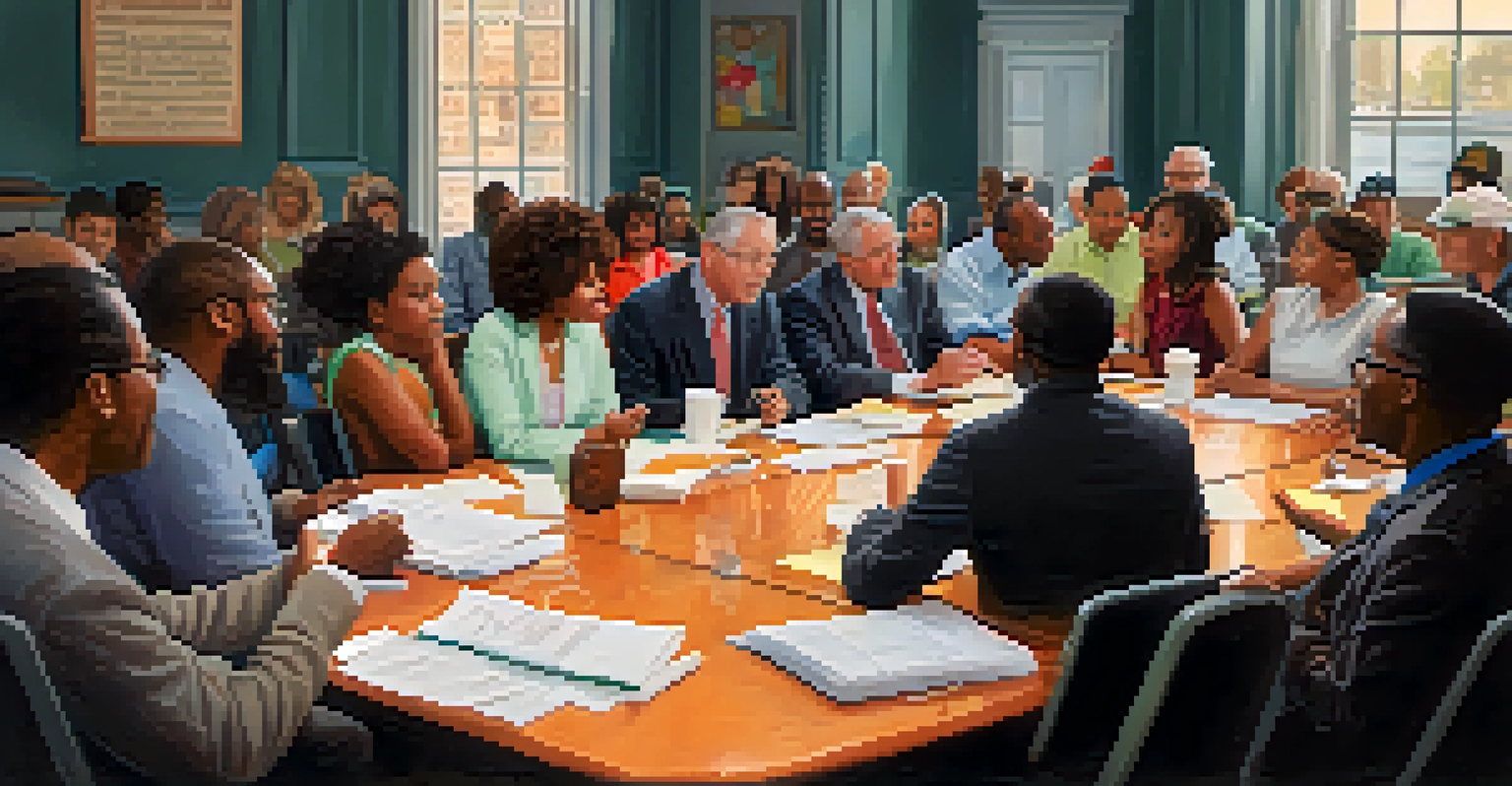Philadelphia's Role in Shaping Modern American Policy Today

Historical Foundations: The Birthplace of American Democracy
Philadelphia is famously known as the birthplace of American democracy, hosting the Continental Congress and the signing of the Declaration of Independence in 1776. This pivotal moment laid the groundwork for modern democratic principles, such as individual rights and self-governance, which continue to resonate in policy discussions today.
Democracy is not a static thing. It is an evolving process that requires the participation of all citizens.
The city also played a crucial role during the Constitutional Convention of 1787, where delegates gathered to draft the United States Constitution. This document established the framework for federal governance and has influenced countless policies over the years, highlighting Philadelphia's lasting impact on political structures.
Today, Philadelphia is often viewed as a symbol of civic engagement, where the ideals of democracy are continuously debated and redefined. This rich historical context helps us understand how past events shape current American policies and governance.
Key Policy Innovations from Philadelphia
Philadelphia has been a hotbed for innovative policies, particularly in areas like education and public health. For instance, the city has implemented progressive educational reforms aimed at addressing inequality, serving as a model for other urban centers across the nation.

Moreover, Philadelphia pioneered various public health initiatives, such as its early adoption of vaccination programs in the 18th century, which have evolved into today's public health policies. These innovations not only improve local conditions but also influence national discussions on health care and preventive measures.
Philadelphia: Democracy's Birthplace
The city's historical events, like the signing of the Declaration of Independence and the Constitutional Convention, laid the foundation for modern democratic principles.
By showcasing successful policy implementations, Philadelphia helps inspire other cities to adopt similar strategies, making it a critical player in shaping modern American policy frameworks.
Philadelphia's Role in Civil Rights Movements
Throughout history, Philadelphia has been at the forefront of civil rights movements, advocating for social justice and equality. From the abolitionist movement to the civil rights era, the city has served as a rallying point for activists pushing for legislative change.
The best way to predict the future is to create it.
The impact of these movements is evident in contemporary policies aimed at promoting equality and defending civil liberties. For example, the city's historical struggles have informed current dialogues around voting rights and police reform, emphasizing the need for systemic change.
By understanding Philadelphia's role in these movements, we can better appreciate how grassroots activism can shape policies that affect millions of Americans today.
Economic Policies Rooted in Philadelphia's History
Philadelphia's economic landscape is rich with history, influencing modern policy decisions related to urban development and job creation. The city has long been a center for commerce and innovation, from its early days as a trading post to its current status as a hub for technology and healthcare.
Policies that promote economic growth often draw inspiration from Philadelphia’s historical successes, such as its emphasis on entrepreneurship and workforce development. This focus on building a robust economy is crucial for addressing contemporary challenges like unemployment and economic disparity.
Innovative Policies Shaping America
Philadelphia's progressive educational and public health reforms serve as a model for other cities, influencing national policy discussions.
As Philadelphia continues to evolve, its economic policies serve as a blueprint for other cities striving to balance growth with equity and sustainability.
Education Policy: Lessons from Philadelphia
Philadelphia's educational landscape offers valuable insights into modern policy debates around schooling and educational equity. With a diverse population and a mix of public, charter, and private schools, the city has been a testing ground for various educational reforms.
Recent initiatives aimed at improving educational outcomes, especially for underprivileged communities, reflect Philadelphia's commitment to fostering a more equitable education system. These efforts resonate with broader national discussions on educational reform, highlighting the need for policies that address systemic inequities.
By examining Philadelphia’s approach to education, policymakers can glean lessons that may be applicable in other regions seeking to enhance educational opportunities for all students.
Cultural Policy and Its National Implications
Philadelphia's rich cultural heritage influences national policies related to the arts and community engagement. The city's vibrant arts scene and commitment to preserving historical sites serve as a model for cultural policy initiatives that promote diversity and inclusion.
By investing in the arts, Philadelphia illustrates how cultural policies can enhance community well-being and economic vitality. This approach not only enriches the local landscape but also encourages other cities to prioritize cultural initiatives as part of their economic and social strategies.
A Hub for Civil Rights Advocacy
Philadelphia has historically been a rallying point for civil rights movements, impacting contemporary policies on equality and social justice.
In this way, Philadelphia’s cultural policies extend beyond its borders, informing national conversations about the importance of arts and culture in fostering community resilience.
Philadelphia as a Laboratory for Policy Experimentation
Often referred to as a 'laboratory for democracy,' Philadelphia provides a unique environment for testing new ideas and policies. The city's diverse population and varied economic landscape create opportunities for innovative approaches to policy-making.
Local government initiatives, such as participatory budgeting and community policing, enable citizens to engage directly with the political process, fostering a sense of ownership and accountability. These experiments can yield valuable insights that inform broader policy development across the nation.

As Philadelphia continues to embrace experimentation in policy, it reinforces the idea that local actions can have significant implications for national policies and democratic practices.